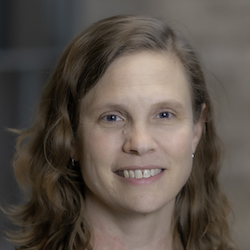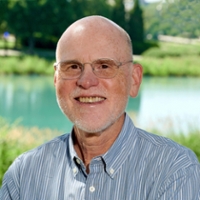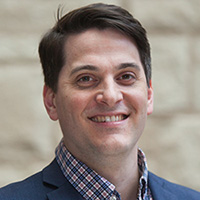CESR Symposium Highlights Connection Between Climate Research and Business, Policy
Professors Jennifer Dunn, Bill Miller, and Jeff Richards moderated sessions during the conference
Advances in technology alone will not be sufficient to successfully overcome the challenges posed by climate change. That’s why it’s crucial for engineering researchers to place their energy- and climate-related investigations in the context of other drivers of change such as policy and business considerations.

“In conversations that we had over the past year or so in lunches that were focusing on the topic of climate change, there were a lot of common threads that arose,” said Jennifer Dunn, associate professor of chemical and biological engineering at Northwestern Engineering. “I heard different people mentioning they wanted to understand how the research they were doing on sustainable energy might be influenced by policy, by things companies and investors are doing. These are things that, maybe as engineers working in the lab or developing scale-up processes, we might not be as familiar with how these forces really affect technology adoption and, in the end, how they might affect our ability to reduce greenhouse gas emissions.”
During the 2021 Center for Engineering Sustainability and Resilience (CESR) Symposium held Friday, October 29, panelists highlighted that connection as well as provided updates on the latest in technology development for addressing climate change.
I heard different people mentioning they wanted to understand how the research they were doing on sustainable energy might be influenced by policy, by things companies and investors are doing.
Jennifer DunnAssociate Professor of Chemical and Biological Engineering
Co-sponsored by CESR, the Institute for Sustainability and Energy at Northwestern (ISEN), and partially supported by the National Science Foundation, the event “Technology, Policy, and Individual Actions: Three Approaches to Address Climate Change” welcomed speakers who discussed numerous topics. Those included promising new technologies and research needs to push technology development toward broader-scale adoption, approaches to working with disadvantaged communities and incorporating their needs in climate change solutions, corporate decision-making perspectives and insights regarding the changing climate landscape, and identifying actionable outcomes and next steps.

The day’s final session, a synthesis panel wrapping up the conversation, was moderated by Dunn and Bill Miller, professor of chemical and biological engineering at the McCormick School of Engineering. Jeff Richards, assistant professor of chemical and biological engineering at Northwestern Engineering, moderated the technology panel with Argonne National Laboratory senior scientist Amgad Elgowainy. CESR engaged Kellogg School of Management professors Megan Kashner and Meghan Busse to moderate the business panel, and Weinberg College of Arts and Sciences professors Kim Marion Suiseeya and Melissa Rosenzweig to moderate the policy panel.
Miller, who co-directs CESR along with Dunn, said that employees and researchers can directly and indirectly pressure their companies to work toward greener and more sustainable methods. Young researchers, Miller said, want to know who will benefit from their efforts.
“If you want to prosper as a company, if you want to get the best people, you have to be doing things that inspire and resonate with them,” Miller said. “We definitely see that as an important consideration for current students.”
If you want to prosper as a company, if you want to get the best people, you have to be doing things that inspire and resonate with them. We definitely see that as an important consideration for current students.
Bill MillerProfessor of Chemical and Biological Engineering
The event’s keynote speech was delivered by Karen Weigert, executive vice president of Slipstream, a nonprofit that tests, delivers, and scales next generation energy programs and products.

During her remarks, Weigert, who is also a sustainability contributor to WBEZ-Chicago’s “Reset” show, discussed how climate change and its byproducts disproportionately impact disadvantaged populations. Certain parts of cities are actually hotter than others because of decades-old policies and zoning, leading to more trees in some areas and more concrete in others.
“We are still seeing those impacts in the physical experience of heat,” she said. “Climate change, while it might be heating the planet, is actually heating parts of our cities differently. Those experiences are fundamental to daily life wherever you are.
“Policy led to this. Investment led to this. Technology led to this,” she added. “How do we think about it?”